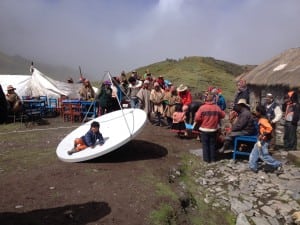[Via Satellite 01-19-2016] Satellite support of remote education needs to continue even during trying economic conditions, according to Jaime Dickinson, president and COO of Newcom International. Describing education as the biggest challenge facing countries in Latin America today, Dickinson told Via Satellite that connectivity used to enable remote education needs to remain a priority.
“In Latin America in some areas, there is no connectivity. No one reaches out to the community and children in these areas; they are totally isolated. So our goal has always been to try to educate not only clients or vertical markets but also governments on the importance of investing in the masses, to bring education,” he said.
Recently acquired by SpeedCast International, NewCom is a satellite and terrestrial communications provider with extensive business in Latin America. Dickinson said the company’s business is approximately 80 percent Latin America, with the remaining 20 percent in Africa.
NewCom has several approaches to bring education to rural regions. Dickinson said sometimes education initiatives are tied to a specific government project. Sometimes they stem from regional projects in oil and gas, mining or financing that are contributing back to the community through schools. Other times it is just NewCom providing the service to remote schools that have no other way to access it. The company has facilitated projects in Haiti, Ecuador, Colombia, Peru, Honduras, the Ivory Coast and elsewhere.
Currently there are a number of high-profile digital-divide programs throughout Latin America, particularly in Mexico and Brazil. Dickinson said the country that inspired him the most is Colombia, describing former president Alvaro Uribe as a mentor in developing such programs, adding that the country paid great attention to detail, vetting potential vendors and making sure services followed through once the media attention died down. Colombia’s digital divide program, previously known as Compartel, is now manifesting in different names like Vive Digital, but continues to expand.
“Colombia is what gave us the idea of trying to follow the same model and replicate it in other countries in the region. We really liked it and were very impressed by it,” said Dickinson. “Colombia implemented different indicators so not just anybody could come in and provide the service. They are constantly monitoring for quality control. They are making sure that schools are being served and delivered what was specified for in the contract. We have seen in other countries projects that are started, paid off and instead of making sure that the service is being delivered, they just forget about it. Many times the schools receive an antenna, modem and maybe service for a month, and then something happens and everybody forgets; there is no continuity. In Colombia there has always been pressure from the administration to make sure that the vendors deliver — and not just deliver the connectivity, but deliver the quality, the speed and everything else that they require.”
Today’s markets in Latin America, particularly for satellite, are feeling the influence of a number of different factors. Certain currencies, notably Venezuela’s bolivar and Brazil’s real, have depreciated significantly. While some Latin American economies are seeing growth, it is not consistent across the region. At the same time, new satellites and the introduction of high throughput capacity pose the risk of a supply glut. In 2015 Euroconsult pointed to Latin America as the number one region for new capacity until 2017. Though factors have caused some business to stall, Dickinson expects a rebound this year.
“The low oil prices in 2015 affected the Latin America dollar exchange with local currencies, causing many government and private sector projects needing satellite capacity (a market based on dollars) to be put on hold. These projects have been piling up waiting for Ka band and HTS to come, and with a much better price per Mbps, it will offset the currency issues, leading to huge opportunities for NewCom and other experienced satellite communications providers in 2016,” he said.
On a personal level, Dickinson said a project that impacted him was in Peru with Kidnected World, a non-profit organization dedicated to connecting young people, and Willka Yachay a non-profit focused on helping indigenous communities preserve their cultures while thriving in the modern world. NewCom helped connect the villa of Q’eros, enabling Internet access and providing education in the same dialect its citizens always used. Located in a hinterland region of the Andes Mountains, NewCom supplied solar panels, antennas and other gear to connect the villa to the world by satellite. The company also donated a year of satellite Internet to a school in the region.
Remote education projects don’t always have a clear immediate economic benefit, but Dickinson stressed that even if not instantly tangible, governments should invest for the benefit of their countries over the long term. After a while, the results do materialize, he said.
“To start commercializing this connectivity, the biggest highway out there is the Internet. When you go to these rural areas where they have never seen a television, for example, or a computer, once you show them the highway, it takes time for them to learn and understand how to get the best and most out of it. Government has to subsidize it for a period of time, and then there are programs that build up in commerce so they can take advantage of this highway. Later on, some regions will actually be helping through this commerce to subsidize these projects. We have seen it in other countries. Now it is a matter of the budget of the region, not the budget of the industry, to continue providing services,” he said.
The post NewCom Spotlights Importance of Remote Education appeared first on Via Satellite.
http://www.satellitetoday.com/telecom/2016/01/19/newcom-spotlights-importance-of-remote-education/
